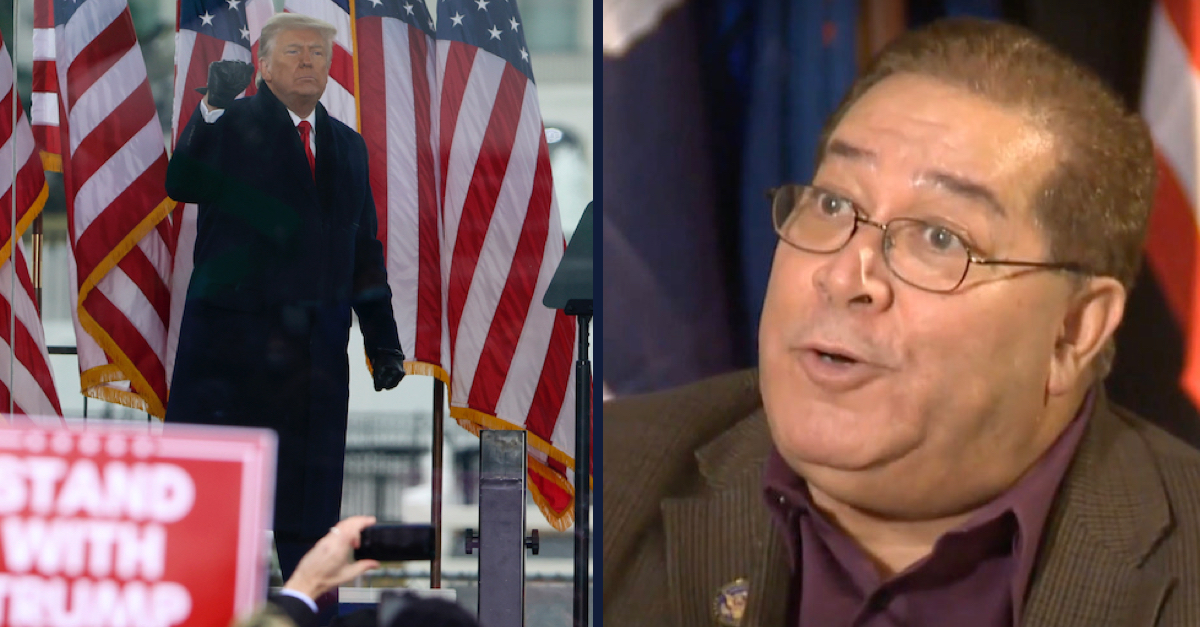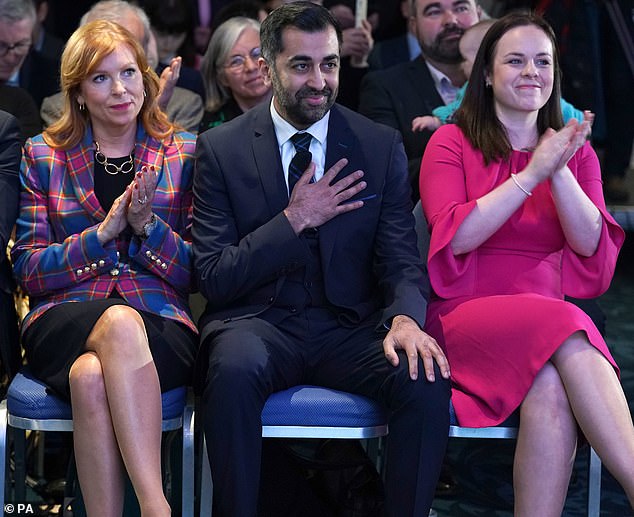
Left: Former President Donald Trump delivers a speech at the Ellipse on Jan. 6, shortly before his mob of supporters ran riot inside the U.S. Capitol. (Photo by Tasos Katopodis/Getty Images). Right: Helaman Hansen via KCRA/YouTube screengrab.
The Supreme Court considered Monday whether it should be a federal crime to encourage someone to remain in the U.S. illegally — or whether such speech is protected by the First Amendment.
As they sorted through their analysis in the case of United States v. Hansen, the justices raised hypotheticals about encouraging prostitution, drug dealing, vaccine-mandate protests, and even suicide — but they left out one highly-relevant example: Donald Trump’s public statements on January 6, 2021 that preceded the riots at the U.S. Capitol.
The case before the court is an appeal of fraudster Helaman Hansen, who was convicted of multiple federal crimes for falsely promising hundreds of undocumented immigrants that they could become U.S. citizens by overstaying their visas, paying a fee, and using “adult adoption.” Hansen was convicted in 2017 of federal mail and wire fraud for his scheme and sentenced to 20 years in prison.
One of the statutes Hansen was convicted of violating is a subsection of 8 U.S.C. § 1324, the federal statute that prohibits “bringing in and harboring certain aliens.” The subsection being challenged by Hansen makes it a crime to “encourage or induce” a non-citizen to reside in the United States while knowing that it would be illegal for the non-resident to do so.
Hansen appealed, arguing that his statements to the immigrants are protected by the First Amendment, and that the statute criminalizing encouraging the overstay is overly broad. Hansen noted the disparity in penalties between the overstaying itself — which is a civil violation without any applicable penalty of prison time — and the encouraging of that overstay, which in his case resulted in the maximum ten-year penalty because he did so for financial gain.
As the justices noted during oral arguments, the Court’s ruling in the case has potential implications for everything from civil disobedience to nonprofit advocacy. First Amendment jurisprudence is clear that incitement of imminent lawlessness is not protected as “free speech,” but the line between “incitement” and “advocacy” is not always clear — and the justices now have the chance to carve out what kind of “encouragement” can be constitutionally criminalized without offending the First Amendment.
Principal Deputy Solicitor General Brian Fletcher argued on behalf of President Joe Biden’s administration that the law in question only criminalizes “aiding or abetting” or “soliciting” a person to unlawfully enter or remain in the U.S., and assured the justices that typically, things like general advocacy would not be prosecuted under the statute.
Fletcher faced questions from Justice Elena Kagan about whether the statute would cover a doctor advising a patient or a lawyer advising a client to stay in the U.S. illegally. Kagan then went even farther.
“Do I understand you to be drawing a line from a friend who says, ‘I know exactly what the law is and I really think you should stay,’ and saying that exact same thing and saying also, ‘I’m going to provide you support when you stay’?” Kagan asked Fletcher. “Is that the line?”
Fletcher indicated that he would not expect casual conversations or even medical advice to be covered by the statute’s definition.
Justice Ketanji Brown Jackson did not seem convinced.
“If the purpose [of the communication] is having the person stay here and that’s unlawful, why wouldn’t giving them food and shelter violate the statute?” Jackson asked.
Chief Justice John Roberts allowed Fletcher to point out that there have not been any examples of actual prosecutions involving such examples.
Justice Sonia Sotomayor, however, did not appear willing to hinge her interpretation on the Biden administration’s general take on what would and would not be prosecuted.
“We do know that the Customs Department made a list of all the people, religious entities, lawyers, and others who were providing services to immigrants at the border,” she reminded Fletcher. “I know of no other statute where the [punishment for] aiding and abetting is greater than the punishment for committing the crime,” she added.
Sotomayor then offered a hypothetical of her own: an undocumented grandmother who expresses her worry at staying in the country illegally to her grandchildren.
“Abuelita, you are never a burden to us. Your grandchildren love having you,” the justice imagined the hypothetical grandchildren saying, and then asked the Biden administration lawyer: “Can you prosecute this?”
When Fletcher responded that he thinks such a situation could not give rise to criminal liability, Sotomayor appeared to lose her patience.
“Stop qualifying with ‘think,”” the justice commanded. “People have to know what they can talk about.”
American Civil Liberties Union attorney Esha Bhandari argued on behalf of Hansen and faced a skeptical Justice Samuel Alito.
“Soliciting prostitution, that’s unconstitutional?” pressed Alito. “What about encouraging someone to prostitution?”
When Bhandari answered that entering into a transaction could be criminalized, but that something less active would not, Alito raised other examples, such as encouraging a mentally disabled person to commit suicide.
“Isn’t that the same?” asked the justice, commenting that the federal government has “a strong interest” in preventing illegal immigration just as it has an interest in protecting vulnerable populations.
Justice Neil Gorsuch appeared disinclined to side with the ACLU in this particular case, given Hansen’s proven wrongdoing. Gorsuch called the case “awkward” in that Hansen’s “encouraging” statements were not innocent, as were many of the examples raised during colloquy.
While the potential for criminalizing political speech and general advocacy was examined from multiple angles, no one in the courtroom Monday raised the particularly relevant example of Donald Trump and the Jan. 6th Capitol riots. The Biden administration has clearly articulated its position: the former president should not be immune from liability for his role in the riot, when scores of Trump supporters overwhelmed law enforcement and forced their way into the building, causing an estimated $2.9 million in damage and forcing Congress to temporarily suspend its certification of Biden’s 2020 electoral win.
In court documents filed in early March, the Department of Justice did not take an official position on whether Trump’s Jan. 6, 2021 speech reached the level of “incitement” necessary for criminal prosecution, but did advance legal arguments about how such a determination might be made. Still, any Supreme Court ruling further clarifying the lines between “incitement” and “protected speech” could derail any DOJ argument against Trump in a future prosecution.
Should the Court rule in Hansen’s favor, as the U.S. Court of Appeals for the Ninth Circuit did, it could bolster any potential Trump defense based on the First Amendment. However, given the justices’ comments from the bench Monday, it appears more likely that the Court will side with the Biden administration and allow Hansen — and perhaps eventually, by extension, Trump — to be prosecuted for encouraging others to commit non-criminal violations of federal law.
You can listen to the full oral arguments here.
Have a tip we should know? [email protected]









